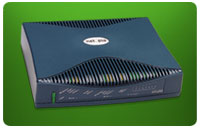Netopia R9100 Router
Review
 Broadband technologies such as cable and DSL modems are
becoming more popular than ever before, due to their high-speed access and always
on connections. While most of the time, it is the home user who uses
such technologies, broadband is becoming a viable solution for small businesses as well.
While there are several reasons for this, perhaps the greatest one
is value.
Broadband technologies such as cable and DSL modems are
becoming more popular than ever before, due to their high-speed access and always
on connections. While most of the time, it is the home user who uses
such technologies, broadband is becoming a viable solution for small businesses as well.
While there are several reasons for this, perhaps the greatest one
is value.
Cable and DSL connections offer substantially higher bandwidth than
traditional dial up or ISDN connections (which operate at a maximum of 56kbps
and 128kbps respectively). In addition, they cost far less than a dedicated
1.5mbps T1 line.
Both of these connections do have a dark side for many
users though: security. Having an always on connection makes it easier for
someone to gain unauthorized access to a computer that is connected to a cable
or DSL modem. For a small business that runs a network, this concern is even
greater, as there are often very sensitive documents stored on the network that
must be kept from prying eyes at all times. To combat this issue, several
companies have designed hardware that is both relatively easy to set up, yet
still provides effective security. One such product is the Netopia R9100
Ethernet Router.
Specifications
WAN
Interface
- Interface to the WAN through any Cable or DSL modem with a
10Base-Ethernet port.
LAN Interface
- Ethernet 8-port 10Base-T
hub with uplink switch to easily connect to another hub.
- Serial Console
port Management port for direct console connections to PC (DB9) or Macintosh
(mini-DIN8), cables included.
- 10Base-T Ethernet/WAN port can be used as a
LAN interface when LAN segmentation is desired.
Advanced
Features
- Network Address Translation: (NAT) improves network
security by hiding internal IP addresses from the public WAN. NAT also reduces
the cost of Internet access by allowing users on your LAN use unregistered or
unofficial IP addresses and then to share a single registered IP address when
accessing the Internet.
- Dynamic Host Configuration Protocol: DHCP
makes automates IP configuration. As a DHCP client on the Ethernet/WAN port, the
R9100 is"plug & play" ready by receiving its configuration information
automatically from the ISP. Furthermore, as a DHCP server, devices, which are
configured as DHCP clients on the LAN, can automatically receive IP
configuration information from the R9100.
- Exported Services: Allows
Web, mail and other hosts on the LAN to be visible to clients on the WAN.
-
LAN Segmentation: Separate LAN workgroups in an enterprise
environment.
- Modular Architecture: Flexible dual WAN port hardware
design, enables easy upgrade of WAN interface module to other currently
available or future WAN interface module from Netopia.
Setup and
Management Features
- SmartStart: Windows 95/98 or MacOS
application allows for automatic, semi-automatic or manual configuration of the
router over Ethernet network.
- Smart View: Java monitor tool that
displays real time view of current router activity including status lights, most
recent connection statistics, and a one-button manual connection to any defined
connection profile.
- Advanced Configuration: Menu-driven tools
accessible via Telnet, direct console connection or SNMPv1 with MIB-II,
interface MIB and Ethernet MIB.
- Firmware: Upgrade firmware in flash
memory via a remotely accessible TFTP client or X-Modem transfer using modem or
direct cable connection. Configuration retained during upgrades or power
failures with battery backup.
- ICMP Ping: To test IP connectivity
from router to local or remote site.
- Trace Route: To determine
routing path to particular host name or IP address with a maximum setting for
hops and time out. Allows for reverse DNS.
- Trivial File Transfer
Protocol (TFTP): client to upload and download firmware and configuration
files directly to the router.
Security Features
- Secure
VPN: (Available Q4 1999) Setup encrypted Virtual Private Networks for
building intranets and extranets to serve remote users, branch offices and
business partners. Integrated PPTP Access Concentrator (PAC) and Network Server
(PNS) functionality to provide compatibility with Microsoft Windows 95/98/NT
Dial-Up Networking clients and NT Servers. Can replace NT server to provide VPN
access to remote users. Also includes ATMP for interoperability with Ascend
routers and 56-bit DES Netopia extensions for an efficient, secure VPN
connection between remote offices using Netopia routers.
- Network Address
Translation (NAT): Hides your LAN behind one Internet IP address by
translating IP addresses on a LAN to a single static or dynamically assigned IP
address on a WAN.
- Built-in Firewall: Built-in pre-configured
firewall to disallow all inbound traffic; NetBIOS filters pre-configured to
minimize unnecessary connections.
- Packet Filters: IP & IPX (RIP,
RIP2 and SAP) filtering; Filter packets on a per-connection profile basis for
source/destination address, service and protocol. Up to 255 rules in up to 8
filter sets.
- Management Security: Password protected with up to 4
user names and passwords, SNMP community string sends current router activity
including status lights, most recent connection statistics and a one-button
manual connection for any defined connection profile. Running MacOS without Open
Transport. Allow Gateway IP access to computers on a LocalTalk
network.
Optional AppleTalk Kit
- AURP AppleTalk
Tunneling: Connect remote AppleTalk networks over the Internet or other IP
backbone, includes Free Trade Zone, network number re-mapping and hop count
reduction, with adjustable tickle timer and update interval.
-
LocalTalk: interface via Auxiliary port with included RJ11
-
PhoneNET: connector computers running MacOS without Open Transport
-
LocalTalk-to-Ethernet: routing for Phase II AppleTalk, with Soft-,
Hard-and Non-Seeding options
- MacIP server: for dynamic IP address
assignment to computers running MacOS without Open Transport
- MacIP
gateway: services allows IP access to computers on a LocalTalk network
-
SNMP: AppleTalk MIB-I

